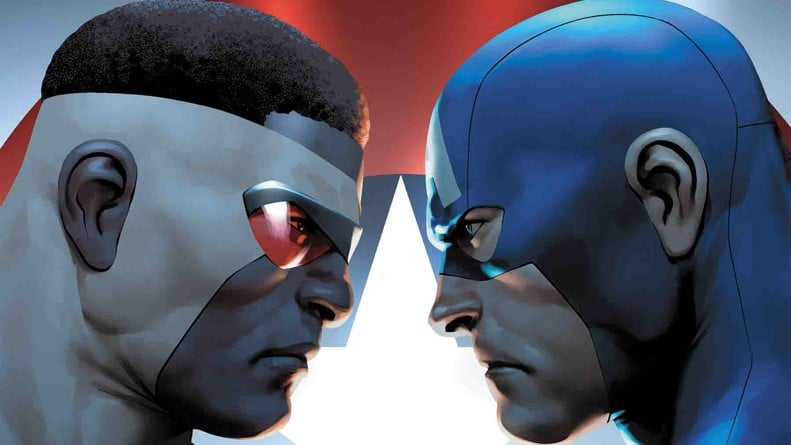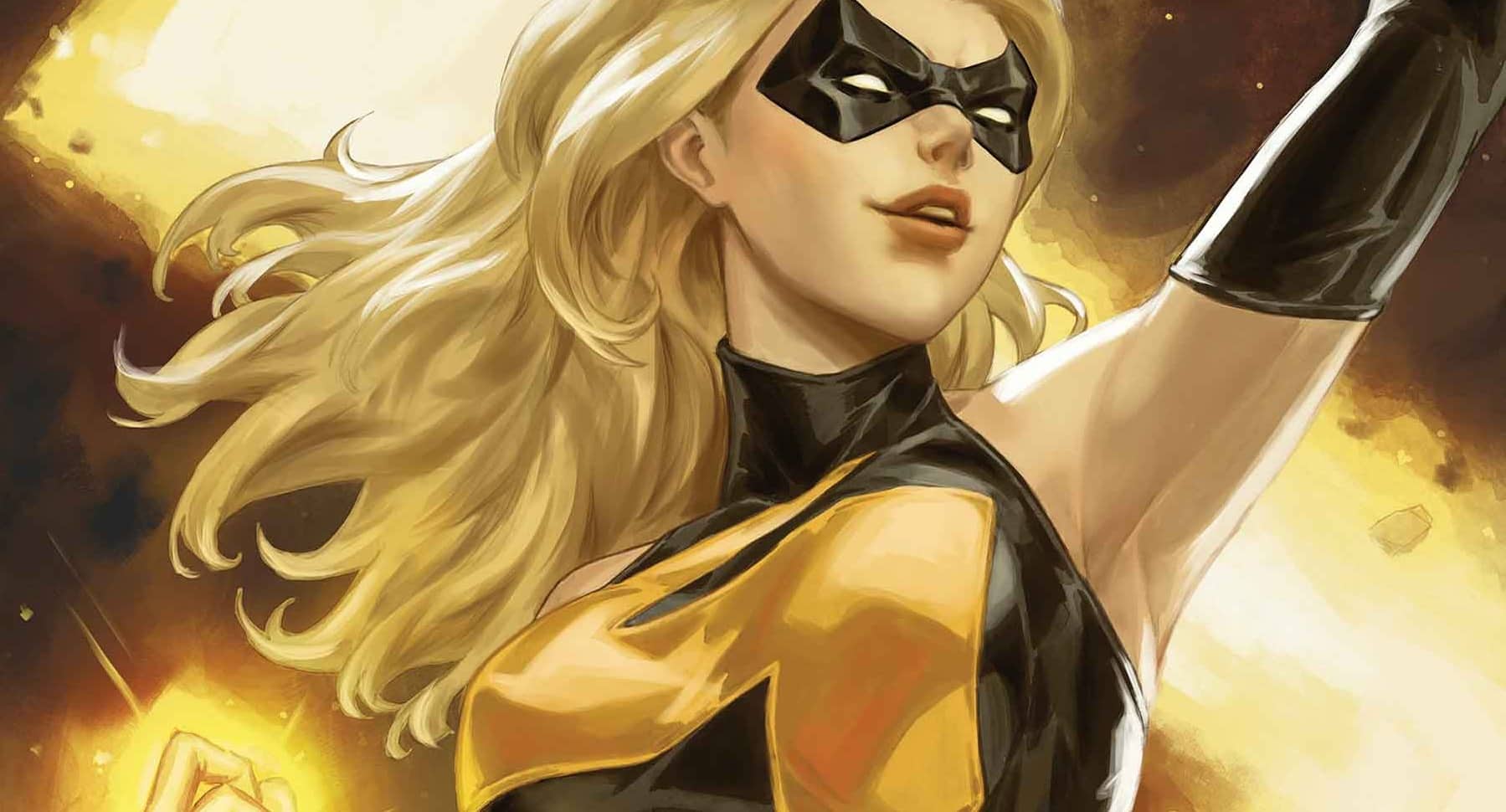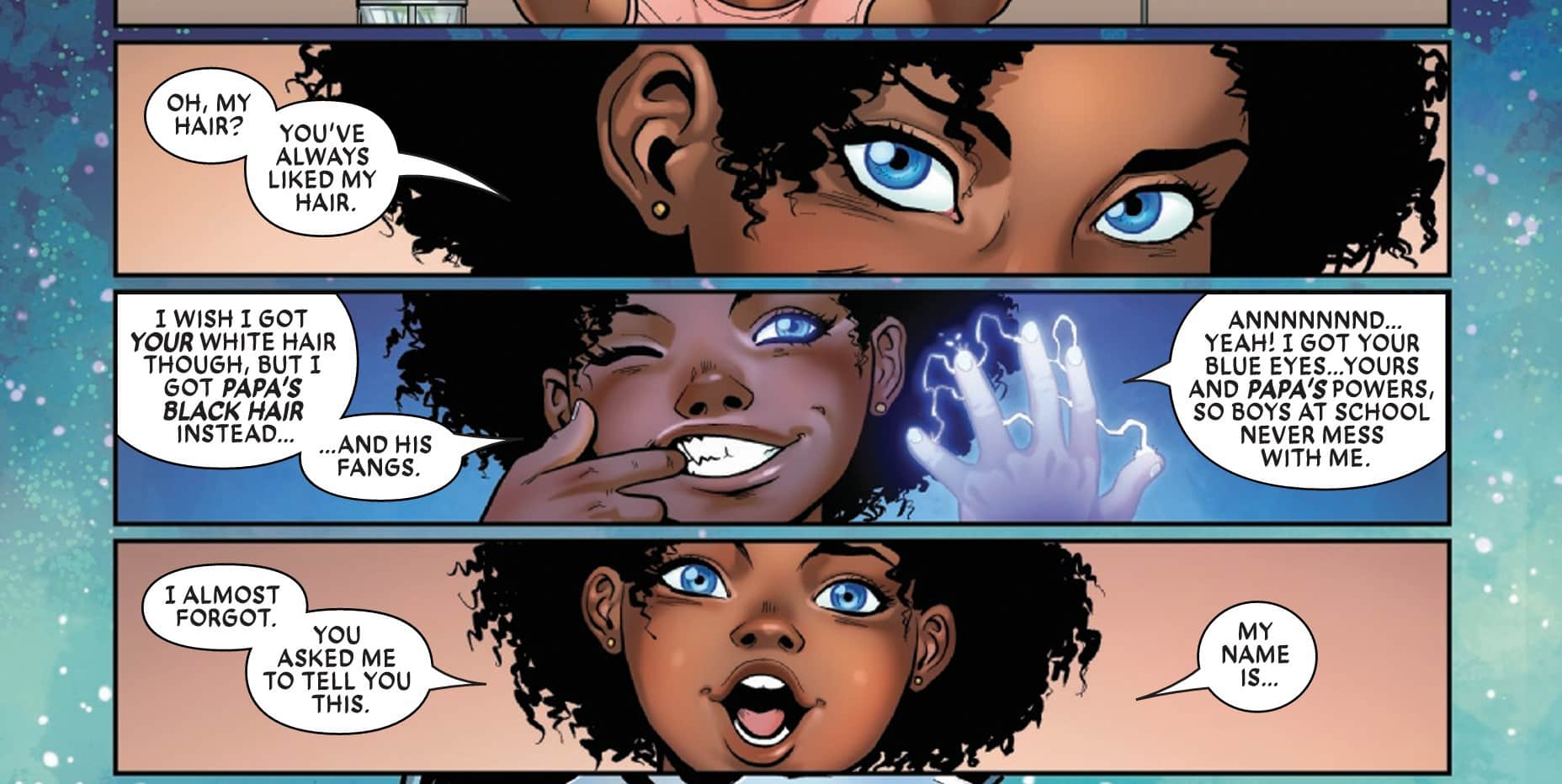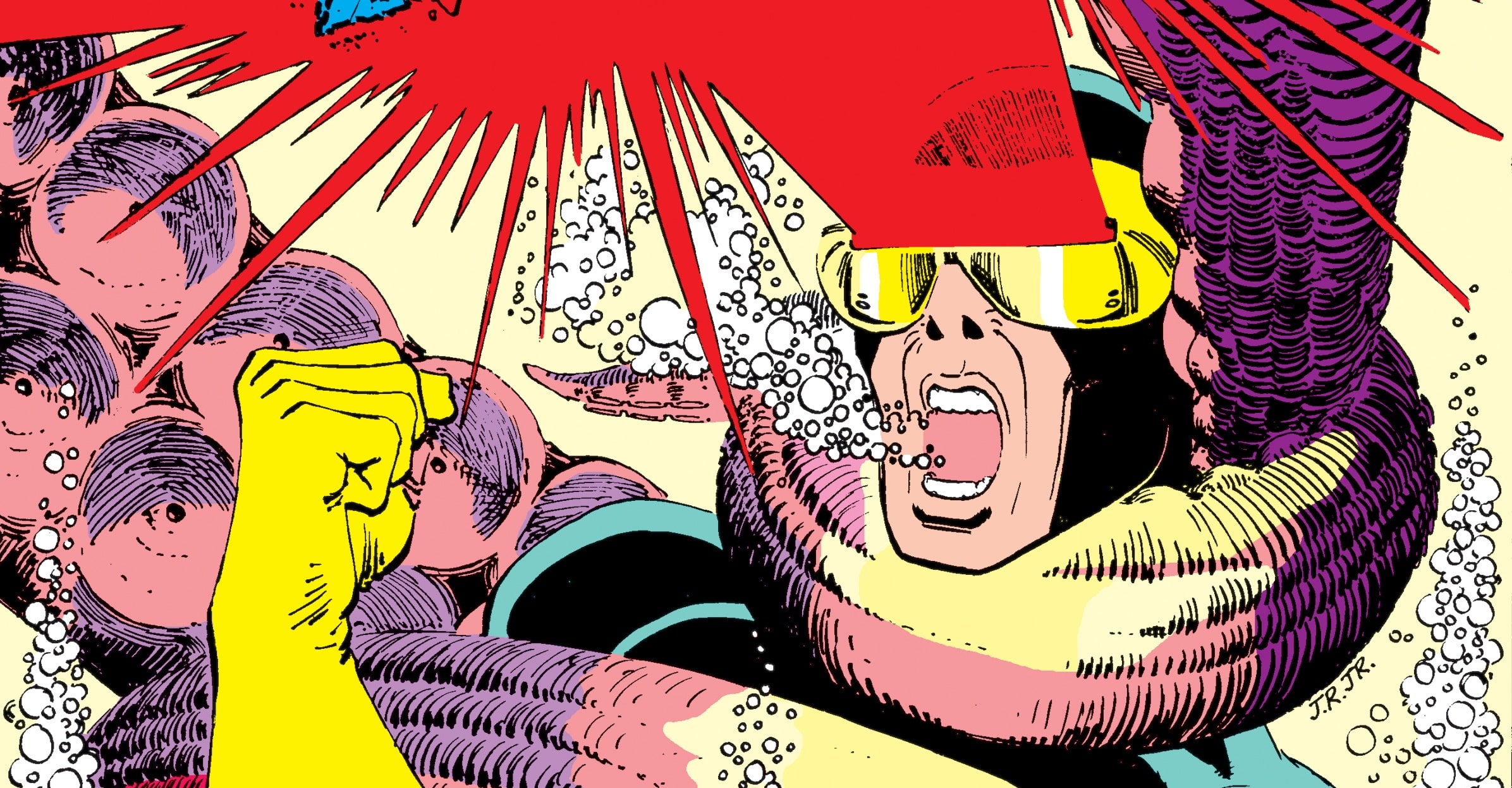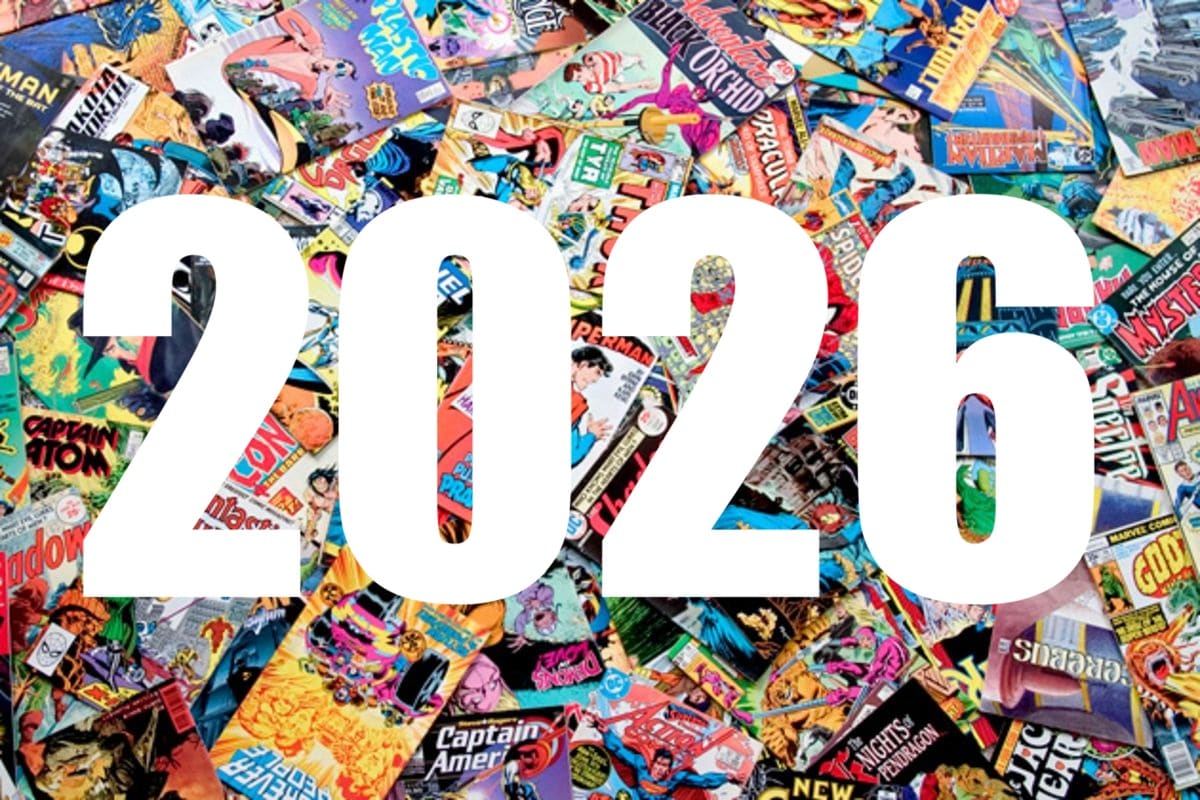I have just come home after finishing my freshman year of college. Or as I called it, the worst year of my life. Everything that I used to enjoy, from video games to novels, does nothing to ease the constant emptiness I feel. Nothing is new, everything is something I’ve seen before, played before, read before. I don’t know it at the time, but my depression was rearing its head.
Out of ideas for how to entertain myself, I consign myself to the abyss that is Reddit. Deftly avoiding racist remarks from white teenage boys hiding behind screen names, I mindlessly scroll. Until I see something that catches my attention. I see a post on the comic books subreddit, showing Captain America fighting the Sons of the Serpent.
I remember comic books. A few years ago I got a bunch of Marvel trades, all events, and voraciously read them. I knew comics. I knew their cycle of conflict and resolution, how each “event” only served to set the table for another, how nothing really changed. But what I see here, what catches my attention, is something different. Something I’ve never seen before. I see a Black man as Captain America. And he is beautiful.
For the first time in a long time, I feel excited. A few days later, I do a cursory Google search and discover that the nearest comic book shop is actually less than a mile away from my house. I walk over there, ready to spend however much money I need to get this story. I’m ready to be completely and utterly consumed by the world of monthly ongoing comics. What I don’t realize is how important this trip will be.
It’s Wednesday, May 26th, 2016. I walk into my local comic shop for the first time. It’s packed. In the din of this small shop, I hear people excited for this new DC Rebirth thing. Sure, I’ll check it out. But then, on the shelf, I see what I came for. 9 issues of Captain America: Sam Wilson by Nick Spencer. And right next to them, something I didn’t expect – Captain America: Steve Rogers #1. I grab that, too. I don’t know what I’m in for.
I read from the beginning. After just 2 issues, I’m sold. Sam Wilson is defined not by his faith in America, but in his lack of it. In a world after Trayvon Martin’s murder, a world where Donald Trump has won the Republican Primaries and is actually a Presidential nominee, I connect with this. Steve Rogers’ idealism is dangerous, it allows rot to spread and harm to occur. It can’t be trusted.
I keep reading, and everything I believe is proven correct.

Nick Spencer’s Captain America run garnered massive controversy after Captain America: Steve Rogers #1, and only got more and more polarizing from there on. By the time he finished his run with the event Secret Empire, nearly everyone was ready for it to be over. Everyone but me.
I’d latched onto the run from the very beginning – not only was it one of the first ongoing comics I read, it helped guide my worldview. Sam Wilson’s cynicism – the lack of faith he had in America and its people – was based upon a lived experience, one that I could not help but relate to. I’m not Black and would never claim that my struggles are the same as those of Black people’s, but as a brown man in a post-9/11 America, I’ve certainly developed my own cynicism towards the white majority of the nation.
When Steve Rogers revealed that he was Hydra, it was a shocking moment. Plenty of people reacted in horror and disgust – many readers did not want to read about the symbol of the nation being evil. A line I saw frequently was “I use comics as an escape from the real world.” But this always struck a nerve with me. This “escape” into a world where the straight white blonde man is a perfect ally who saves the day felt honestly offensive – especially when there was a better Captain America who wasn’t a Nazi.
Where white people felt discomforted by their icon revealing his “true” colors, I felt vindicated. See, during this entire span of May 2016 through September 2017, I was feeling what Sam felt in real life. Countless friends I went to high school with, so many people who were important to me, were revealing that they supported Donald Trump. So many people were agreeing with things like “shithole countries” and “Make America Great Again.” And watching this story unfold, seeing Sam Wilson have to deal with what is essentially the same struggle I was having was a massively important experience. It was honestly comforting in its own way – I could see that I wasn’t alone.
As the story went on, it pushed harder. Sam Wilson had to deal with an anonymous police force who profiled and brutalized Black people, fought against the USAgent and was even secretly undermined by his best friend Steve Rogers. Every move he made seemed to anger someone or another, and every step he took had unforeseeable consequences that Sam and his friends had to deal with.
This endless onslaught of blow after blow to Sam’s morale culminated in what could only be described as defeat. Rage was beaten nearly to death, Steve Rogers took over the world as the Supreme Leader of Hydra, and Sam gave up being Captain America. He fought the good fight for as long as he could, but it wasn’t enough. Sam Wilson wasn’t enough.
This mirrored the real world in a way that, again, was incredibly cathartic. Donald Trump had won the Presidential Election and been inaugurated despite losing the popular vote. More and more people I considered friends revealed they’d be happier if people like me didn’t exist. When I tried to convince them why voting Republican was harmful, even my white liberal friends told me to calm down and leave them alone – my insistence on my own safety was viewed as excessive.
By Donald Trump’s inauguration, I was tired. I felt like the entire country had been taken over by The Enemy. People who weren’t actively supporting the ruling party were, at best, silently accepting what we had. I went to marches, I actively protested as long as I could, but I couldn’t handle it anymore. If everyone was willing to stand by and continue their lives as the world was burning, there was nothing I could to to stop it. Sam Wilson’s choice to stop being Captain America, while obviously more significant in the world of Marvel, exactly captured how I was feeling.

And then, in the very comic run that had always been there to tell me I wasn’t alone, the evil Steve Rogers lifted Thor’s hammer, and Hydra took over the world. Marvel’s publicity department had their work cut out for them, as fans furiously claimed that Marvel was promoting Nazism, that by having the villains win, they were giving the real life Nazis what they wanted. I, admittedly, don’t respond as harshly to Nazi imagery in media – so this was not at all bothered by any of the imagery in the comic. Sure, Marvel offering comic shops Hydra merchandise to advertise the event was poorly planned, but I didn’t consider it offensive. Regardless of my feelings on the matter, though, Marvel’s PR was overworked and I could visibly see how this was affecting the conclusion to this 2 year long comic run.
Secret Empire was the weakest part of the run. Conceptually, it was just as strong as the rest, but it seemed like Marvel had begun backtracking on its more contentious elements, clearly wanting to get it over with as quickly as possible. It felt as if Spencer had to suddenly change course from what was clearly going to be Sam Wilson’s ultimate triumph over the evil Steve Rogers and turn it into a “return” of the classic blonde-haired blue-eyed Captain America. Secret Empire ended with the conclusion of people accepting Sam Wilson, but it was at odds with the fact that he wasn’t actually given the moment of triumph that the event was building towards. Instead, Sam would give the shield back to Steve a month later – Marvel clearly wanted to return to Steve’s brand of non-controversy.
What was even more frustrating is that the critics of Secret Empire weren’t even happy with what felt like an altered ending. The story that I needed was derailed because it made white people uncomfortable, and we ended up somewhere no one wanted. Sam Wilson wasn’t allowed to prove his worthiness and defeat the personification of the evil currently pervading our country, he had to be saved by the “perfect” white man who makes everyone feel comfortable. What should have been the story of Sam proving that he’s the Captain America for the modern era turned into yet another celebration of the white man from the 40s.
I spent a long time resentful of the people dogging on Nick Spencer’s Captain America run. It was clearly their fault we didn’t get the proper ending to the story. What prevented the story from being empowering was the discomfort of the white readers who put more stock into what Steve Rogers was doing rather than what Sam Wilson, the real Captain America, was doing.
In my excitement for the upcoming Falcon and the Winter Soldier show, I went back to this run that spoke to me in my formative years. I went back to revisit what I found so powerful, the story that made me understand just how strongly I need to fight for my own identity. What I found made me almost wish I didn’t.

The run starts strong. Sam is clearly trying to be a different Captain America than Steve was, as he vocally admits that he can’t stay above the fray in political conflicts. When he acts upon his beliefs, white America lashes out. But Sam continues to do what he thinks is right – he tries to help people, those who really need it. This is good! It’s what I want to see from a Captain America comic, especially one that focuses on a Captain America that isn’t white. When Spencer throws Sam at the Sons of the Serpent harassing undocumented immigrants, the book works.
Even better is how Spencer juxtaposes Steve and Sam from the very beginning. Specifically Old Steve. The conflict of ideals between Sam, the modern, youthful, Black Captain America and Steve, the outdated white old man, layers both characters incredibly well. Steve’s idealism is born of privilege, while Sam’s cynicism is born of experience.
But fairly rapidly, I began to notice that the run was… not really pushing for any significant change. Comics don’t need to serve as agitprop, but a Captain America run that feels like it’s not making a strong statement feels pointless. There’s a lot of jokes and potshots at right-wing and alt-right bigots and outlets like Fox News, but there’s no real actual delving into why they’re wrong, or what any positive alternative would be. No, instead of anything actually substantial, large swathes of the run’s political commentary feel like Nick Spencer patting himself on the back for being such a smart and enlightened liberal man.
I tried to read it more charitably. After all, this run was so meaningful to me the first time I read it. Surely the significance I took from it was still present. But by the end of the first trade’s worth, I was already frustrated with how Spencer portrayed the real world conflicts he was bringing into the story.
Issues #4-6 of Captain America: Sam Wilson focus on Sam and the new Falcon Joaquín Torres taking on the Serpent Society, now rebranded as Serpent Solutions, Inc. It’s deliberately a satire of corporate culture and the lack of ethics and oversight big corporations have. And it starts off strong, with some biting criticism of this culture. But when Sam finally defeats them and has them at his mercy, one of the CEOs throws out some “too big to fail” excuse that is both false and a terrible reason to let anyone off the hook.
But Sam completely agrees with this line of thinking, deciding that the reasonable course of action was to incarcerate one of the CEOs and have the rest of them buy up all his businesses. This was depicted by the series as the right thing to do.

Again, I tried to read this more charitably. Maybe Joaquín’s indignation at this injustice was supposed to be righteous. Maybe the point was that Sam was making bad choices out of a misguided sense of appeasing both sides due to his new title. And this reading almost worked. Almost.
When Rage, the one time New Warrior, appears, he feels like the righteous fury that Sam should be feeling. Everything he wants to fight against is wrong, everything he disagrees with is bad. Rage has no patience for appeasement or half measures. He’s a refreshing voice in this run, one that feels primed to push Sam over the mountain of centrism and force him to understand that he needs to be a force for radical change.

Rage and Joaquín’s presences in the book appear to push in the right direction. Rage especially focuses entirely on the issue of excessive police brutality, with the Americops as faceless police that allow for harsher depictions of the police as an institution. My reading of the run worked – Rage was fighting an objective evil, a superhero version of a genuinely terrible problem that exists in the real world. Sam’s condescension and insistence that Rage was going about solving his problems the wrong way was something that would be refuted by the story. The run was saying something.
But that all fell apart. In one of the most infuriating comic issues I’ve ever read, Nick Spencer showed his true colors.
Captain America: Sam Wilson #17 starts off with Joaquín, the new Falcon, watching the Marvel version of Fox News and seeing the Marvel version of Tomi Lahren slander him and make strong implications about him due to the fact that he’s an undocumented immigrant. Sam tries to tell him to calm down, but Joaquín goes off to confront her anyway, along with Rage. But when they go to confront this clear parody of the 2016 right wing media, they’re attacked by something worse – Nick Spencer’s parody of 2016 left wing media.

Spouting lines about safe spaces and trigger warnings, these college students are convinced that microaggressions deserve corporal punishment. The entire issue is centered around saying that the left is just as bad as the right, using Twitter leftism as a strawman to advocate for Nick Spencer’s brand of enlightened centrism. It’s a genuinely terrible comic, one that is so proud of itself for taking this principled stance that made up leftists are just as bad as real life bigots, that it forced me to confront the harsh truth – what I got out of Nick Spencer’s Captain America was not what he put into it.
See, this issue’s purpose was not to portray Falcon and Rage’s ideology as correct, but to show that they’re the ones who needed to see things Sam’s way. Sure, the right wing is bigoted and actively pushing for harm, but pushing too hard in the other direction – you know, for equality and tolerance and safety – is just as abhorrent. Joaquín’s frustration at Sam’s solution for the CEOs is just that of an immature child who doesn’t understand how the world works. Rage needs to calm down, because otherwise he’ll turn out just like these college students who tried to kill him.
One of the most compelling parts of the run my first time through was that every time Sam tried to be vocal, every time he advocated for significant change, he was undermined by the evil Steve Rogers. To me, the point seemed to be that Sam needed to continue to push, to overcome the bad actors and snakes in the grass, and fight until his righteous goals were reality. But on a reread, the intended conclusion is obvious – Sam shouldn’t push that hard. According to Nick Spencer, there will always be a bad actor, an immovable impediment to progress led by a Black man. Sam needs Steve Rogers to save him, because people will listen to Steve Rogers. And the worst part of this message is that it claims that more people will listen to Steve because he’s a moderate. Everything I read as affirming my own struggles as a minority in America was a construct in my own mind – the run was entirely about how Steve Rogers was the best man for the job.
And honestly, thinking about it more, I should have seen this. Nick Spencer notably opposed the punching of actual Nazis – of course his run on Captain America would spit in the face of the very purpose of the character. This was never a story about a modern Captain America who represented modern America. This was never a story about my Captain America. It was about another failed replacement for Steve Rogers. A backup, who filled in until the starter could take his job back. This was not my story.
It’s a gutting feeling, to realize that something that you held so close to your identity, something that guided your own beliefs, was never truly for you. But it’s okay. Because while this comic was never about my Captain America, it allowed me to understand who my Captain America is. The catharsis and meaning I got from this run are real, even if they were of my own making.
Vishal Gullapalli is highly opinionated and reads way too much.

